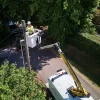Report Casts Doubt Over Scotland’s R100 Superfast Broadband Plan
The Scottish Government’s future £600m R100 strategy has come under pressure after a new 2018 report from Audit Scotland, which works to ensure that public money in Scotland is spent correctly, warned that it “will be difficult” to deliver the stated ambition of 100% “superfast broadband” (30Mbps+) coverage by 2021.
The good news is that the £400m+ Digital Scotland (DSSB) project with BT (Openreach), which has so far reached an additional 900,000 premises via a mix of Fibre-to-the-Cabinet (FTTC / VDSL2) and a little Fibre-to-the-Premises (FTTP) technology, is confirmed to have achieve its primary targets. “Without public-sector investment, only around two-thirds of premises in Scotland would have access,” said the report.
In other words, Audit Scotland confirms that at the end of 2017 some 95% of Scotland had gained access to a “fibre broadband” FTTC/P network (falling to 90% for those able to access superfast speeds of 24Mbps+). Since then we know that the current figure for “superfast” coverage (here) has gone from 90% to around 93-94%.
Advertisement
Strong take-up also means that the programme is now expected to reach 60,300 more premises than originally planned, which means that the existing contract(s) will run until September 2019. The report adds that Openreach is “surpassing its contractual commitments to provide speeds of at least 24 Mb/s to 77 percent of premises in the contract areas” (the contract text is private, so this is hard for us to check).

Sadly the above chart doesn’t clarify whether it’s only displaying the raw fibre-based network coverage or those regions able to receive “superfast” speeds. You can listen to a brief audio summary of the report below or read on for our summary.
Funding for Digital Scotland
The report includes a useful breakdown of how much money has actually been spent, which is something we haven’t seen since the last report in 2016. Audit Scotland states that by March 2018 the programme had resulted in some £259 million of public investment being paid to BT (£149m from the Scottish Government and £110m from the Highlands & Islands Enterprise); £27m less than originally planned.
Advertisement
At completion next year it’s forecast that the total expenditure under the existing Digital Scotland contracts will reach £442m. The reason for this is largely because BT also invested £126.1m of its own private money in the original contract and another £20m on a later extension, part of which helped to compensate for some incorrect modelling by the Scottish Government of EU funding.
Audit Scotland Statement
The increased expenditure is due to BT investing £20 million of its own money as a result of extending the contracts and £18 million of additional income from higher than expected take-up [clawback / gainshare]. Under the terms of the contracts, this money is repayable to the Scottish Government and HIE’s investment funds.
They decided to use the funds to reinvest in the network. This is partly offset by a reduction in EU funding from £20.5 million to £12 million as a result of the Scottish Government developing its understanding of what elements of the project were eligible for EU support.
Speaking of reinvesting public money, the report notes that the Scottish Government and HIE have so far approved a reinvestment of £57.4m. This was earned through a combination of clawback (public money returned due to high take-up), interest accrued on a £20m advance payment made by HIE to BT at the start of the contract and savings made during the deployment phase. This is being used to help BT extend their roll-out (i.e. the additional 60,300 premises).
However the Scottish Government has not yet assessed the actual economic benefit of their investment to date, although they have commissioned further analysis and plan to publish this later in 2018. “It is likely to be difficult to distinguish the economic impact arising from public investment in the broadband network from that of broadband installed by commercial operators,” said Audit Scotland.
Failings in Community Broadband Scotland (CBS)
At the start of this year we reported that HIE’s Community Broadband Scotland (CBS) initiative, which provided public funding to help setup new alternative broadband networks in very remote rural areas, was coming to an end (here). Part of that was due to the obvious coming conflict with the new R100 plan, but today’s report also confirms that CBS “did not deliver anticipated benefits” to rural areas.
Advertisement
The Scottish Government funded CBS with £7.5m and by the end of March 2018 it had spent £6.4m on support for 63 projects. Overall this only delivered 13 successful projects to reach 1,936 premises, while 13 other projects failed to find suppliers, 35 projects received small grants for feasibility studies but did not progress further, 1 project failed (see the AB Internet story) and 1 other is still seeking a supplier.
The CBS scheme also faced various problems with bureaucratic processes (i.e. EU state aid rules and public sector procurement requirements) and the problem of establishing whether or not an area was due to be covered by the existing Digital Scotland deployment via Openreach.
Challenges for R100
The Scottish Government has now shifted its focus toward the new £600m Reaching 100% (R100) superfast broadband roll-out programme, which raises the definition of “superfast” to 30Mbps+ and aims to achieve universal covered of that by the end of 2021 (here and here); March 2022 as a financial year. Some £21m of this is coming from Broadband Delivery UK.
Today’s report states that this investment is aimed at prioritising superfast connections to as many as possible of the estimated 147,000 rural premises not currently receiving at least 24Mbps, which leaves an estimated 64,000 premises (211,000 total) not included; 30,000 of those are urban (the rules make it difficult to use state aid on those) and 34,000 are in rural areas where speeds of 24Mbps+ may already be possible.
However the report warns it is “unlikely” that all of the 147,000 premises identified for R100 will be covered and that “further investment” beyond £600m “may be necessary to complete the R100 programme,” although much will depend upon what sort of solutions and suppliers are chosen.
The first contract is also seeking to encourage greater use of ultrafast “full fibre” (FTTP) technology. For example, it specifies 11 mandated areas, all in the North lot, where 25% of premises must be able to get speeds of at least 100Mbps. Achieving the overall coverage goal by 2021 could be another problem area.
Audit Scotland Statement
It will be challenging for the Scottish Government to deliver within the time-scales for several reasons:
• Contracts will be awarded in early 2019 leaving less than three years for the Scottish Government to deliver its commitments to the most complex premises.
• Detailed arrangements for the aligned intervention scheme have still to be finalised, with a project manager only coming into post in summer 2018. Depending on how the scheme operates, it is likely that the process to apply and provide a solution will be lengthy.
On top of that the report states that there is currently no overall strategy for monitoring or mapping out existing and future activities. Nevertheless the final bids for R100 are due to be submitted in January 2019 and the Scottish Government anticipates it will award the contracts in March 2019, which Audit Scotland says is “slightly later than originally planned to allow bidders more time to prepare their bids.”
The above statement is probably glossing over our prior report of a legal dispute between two of the potential suppliers, BT and Axione, which could also be impacting the process (here). Nevertheless Audit Scotland concludes by making several recommendations.
Audit Scotland’s Recommendations
• Establish robust contract management and assurance processes to ensure the next round of contracts can deliver value for money
• Have the right skills and people in place for the duration of the contract. Continuity will be critical as it is a complex programme requiring specific skills (programme management, financial,commercial, and technical)
• Publish clear time-scales for R100 by summer 2019 and communicate effectively with stakeholders so rural communities know what to expect, when, and can make decisions about how they want to proceed
• Take account of lessons from CBS and the planned assessment of the benefits from the two contracts when developing the ‘aligned interventions’ voucher scheme as part of R100
• Develop and publish an overall strategy for delivering its world-class vision which includes mapping out and monitoring existing and future digital infrastructure activities, and a realistic timetable with targets for delivery.
Fraser McKinlay, Director at Audit Scotland, welcomed the progress so far but also gave a warning: “As well as being the toughest hurdle, it is not yet clear how the Scottish Government is going to fulfill its pledge to deliver superfast broadband to everyone by the end of 2021.”
In fairness the R100 procurement process was always expected to take a long time – not unlike the similar scheme for Wales – which as above is largely down to the sheer complexity of figuring out how to bring superfast broadband to some of the most remote and thus expensive (to reach) parts of the country.
On top of that there’s often a gap between political delivery targets and what can actually be delivered, which once again is something that can only be refined by choosing a supplier and agreeing a clear deployment plan. Until that happens we won’t truly know what R100 will be able to produce.
Lest we also forget the future potential for some conflict or confusion with the Government’s forthcoming 10Mbps Universal Service Obligation (USO) policy, which is due to be enforced from 2020. In theory any areas designated for an upgrade via R100 may not be able to call on this.
2018 Audit Scotland Report
http://www.audit-scotland.gov.uk/news/broadband-roll-out-faces-its-toughest-hurdle
Mark is a professional technology writer, IT consultant and computer engineer from Dorset (England), he also founded ISPreview in 1999 and enjoys analysing the latest telecoms and broadband developments. Find me on X (Twitter), Mastodon, Facebook, BlueSky, Threads.net and Linkedin.
« Cityfibre Start Laying Gigabit Fibre Optic Cable in West Sussex UK
EE UK Launch 500GB Data Allowance on 4G Home Broadband Plans »

















































Comments are closed